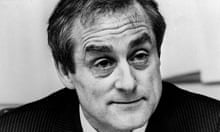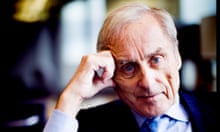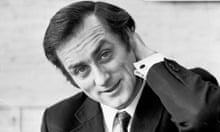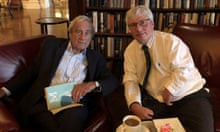Tributes have been paid to Sir Harold Evans, whose commitment to investigative reporting while editor of the Sunday Times helped shape British journalism during the second half of the 20th century.
His wife, Tina Brown, announced the death of “our darling Harry” from congestive heart failure at the age of 92, with former colleagues and rivals praising his contributions to the media.
Under Evans’ leadership between 1967 and 1981, the Sunday Times gained a reputation for its crusading journalism on behalf of the victims of thethalidomide scandal and for stories such as exposing Kim Philby as a Soviet spy.
But his legacy was also shaped by a failed attempt to lead a staff buyout of Times Newspapers and a subsequent falling out with the new proprietor, Rupert Murdoch, which led to Evans’ departure from the company. After this, he remained a lifelong critic of the Australian media mogul’s backroom political deals with British prime ministers.
“Murdoch’s News International came to think it was above the law, because it was,” he would later write.
The son of a train driver born in Salford in 1928, Evans received his first break in journalism as a local reporter aged 16 in Ashton-under-Lyne. After a spell of a national service, he studied politics at Durham University and reentered the newspaper industry in Manchester.
In 1961 he was appointed editor of the Northern Echo in Darlington, where he began launching campaigns in his regional newspaper that had a national impact. One was an exposé of the “Teesside smell” – where he deployed a photographer to prove there was a chemical leak from a local chemical plant.
He later recalled: “The images came out wonderfully – the first photographs of a smell ever published! I splashed them across a whole news page. They proved the Teesside smell was localised, and that, with its pollutant, it lingered.”
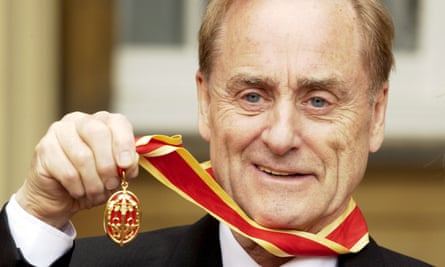
Another campaign ultimately led to the introduction of a national testing campaign for cervical cancer. To build the case he sent a Northern Echo reporter to Canada for weeks to research the topic, in the belief it could save many women’s lives. He then used the pages of his newspaper to lobby the region’s MPs, who in turn harangued government ministers until action was taken.
His reputation on the Northern Echo was enough to earn him a move to the Sunday Times, where he became editor while still in his 30s. He ran the newspaper for 14 years while investing heavily in its Insight investigative team.
When news broke of the Bloody Sunday events in Derry in 1972, he dispatched the Insight team to Northern Ireland to conduct a parallel inquiry to the government investigation, interviewing more than 250 people and concluding that British army paratroopers had fired the first shots at protesters – contradicting the official narrative.
Evans was deeply disappointed when the newspaper’s owners put the papers up for sale, blaming the print unions who acted “treacherously and corruptly in the 1970s and early 1980s, when their anarchy forced out the most enlightened commercial ownership a newspaper group has ever known”.
After a management-led takeover bid failed, both the Times and the Sunday Times were sold to Murdoch in 1981 with the backing of Margaret Thatcher’s Conservative government and legal pledges to maintain editorial independence.
Evans only lasted a year as editor of the Times following Murdoch’s takeover, later writing the bestselling book Good Times, Bad Times setting out how Murdoch interfered in editorial decisions and pushed the outlet to adopt rightwing views.
Evans said his departure from the Times was “the saddest moment of my life” and said his own writings about Margaret Thatcher were the source of the rift with Murdoch.
“Ultimately Mrs Thatcher was the reason I was fired,” Evans told the Independent in 2010. “Because I was attacking her so much. When she started to dismantle the British economy, the most cogent critic of that policy... was the Sunday Times. I wrote 70 per cent of that criticism myself.”
Despite this, his experience with the print unions left him with some admiration for Thatcher: “Britain benefited from her having been there. Britain was becoming so arthritic with labour restrictions.”
His life took a new turn when he subsequently moved to New York with his new wife, Tina Brown, who had recently been appointed the editor of Vanity Fair magazine. He would spent the rest of his life based in the US, founding Condé Nast Traveler magazine, acting as as publisher of Random House and holding a variety of publishing and academic roles.
He is survived by his two children from his marriage to Brown, along with his three children from his marriage to his first wife, Enid, who died in 2013.
Bruce Page, a former colleague, said Evans showed the hard work of finding out the facts behind a story could at the same time be fun “when it was done the Harry Evans way”.
Page added: “Truth for him was always a necessity, because he knew that it is always complex – therefore surprising – and cannot be invented.”

